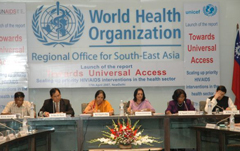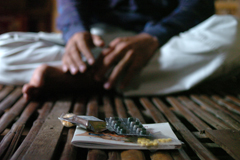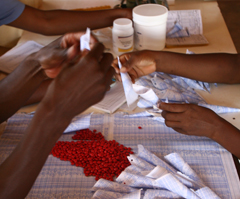
Feature Story
Treatment figures reach 2 million
17 April 2007
17 April 2007 17 April 2007
L to R: Mr K. K. Abraham, President, Indian Network
of People Living with HIV/AIDS, Dr Myo Zin Nyunt,
HIV/AIDS Specialist UNICEF Regional Office for
South Asia, Kathmandu, Ms K. Sujatha Rao
Additional Secretary & Director General, National
AIDS Control Organisation, New Delhi, Dr Poonam
Khetrapal Singh, Deputy Regional Director, WHO
Regional Office for South-East Asia, Dr Teguest
Guerma, Associate Director, HIV/AIDS Department,
WHO Headquarters, Geneva, Dr Denis Broun,
Country Coordinator, UNAIDS, New Delhi, during
the launch of the report in New Delhi
WHO, UNAIDS and UNICEF have launched a new report on scaling up priority AIDS interventions in the health sector. The report, launched in London, Geneva, New Delhi and Buenos Aires on 17 April, highlights that by the end of 2006 more than 2 million people in low- and middle-income countries had access to antiretroviral therapy. Representing a 54% increase over the 1.3 million people on treatment in 2005.
The report also gives an overview of global progress in a number of other priority health sector interventions areas, such as prevention of mother-to-child transmission, HIV testing and counselling, interventions for most-at-risk populations and the links between HIV and TB.
“The significant progress outlined in this report in scaling up access to treatment is a positive step forward for many countries in achieving their ambitious goals of universal access to HIV prevention, treatment, care and support,” said Dr Peter Piot, Executive Director of UNAIDS. “However new data in the report also shows that there is still a long way to go,” he added.

Countries in every region of the world are making
substantial progress in increasing access to HIV
treatment. Photo credit:UNAIDS/O.O'Hanlon
The report highlights a number of key areas in which efforts to scale-up services are insufficient including; the provision of antiretroviral treatment to prevent mother to child transmission of HIV (only 11% of HIV-positive pregnant women in need of treatment were receiving it in 2006); access to prevention and treatment services for people who inject drugs; and the need to scale-up testing and counselling services for people living with HIV (the report highlights that only 12% of men and 10% of women in sub-Saharan Africa know their HIV status).
The Director General of WHO, Dr Margaret Chan said, “We need ambitious national programmes, much greater global mobilization and increased accountability if we are going to succeed.”

The report outlines the need to increase efforts to
accelerate the prevention, diagnosis and treatment
of HIV disease in children. Photo credit: UNAIDS/
A.Gutman
Among the recommendations outlined in the report was the need to increase efforts to accelerate the prevention, diagnosis and treatment of HIV disease in children. Although the number of children receiving treatment increased by 50% over the last year, still only 15% of those children in need of treatment had access to it.
“Children continue to be the missing face of the AIDS pandemic,” said Ann Veneman, Executive Director of UNICEF, “with too many children still missing out on life-saving treatment and access to other essential services.”
The report also gives progress on the target setting progress for universal access to prevention, treatment, care and support which UN member states committed to at the 2006 High Level Meeting on AIDS in New York. According to the report over 90 countries had set targets with 81 setting targets on treatment and 84 setting targets for at least one prevention intervention.
As a Cosponsor of UNAIDS, WHO has undertaken to monitor and evaluate the global health sector response in scaling up towards universal access and to produce annual reports. Towards universal access––scaling up priority HIV/AIDS interventions in the health sector is the first such report.
Links:
Read Press Release
Download full report (pdf 5,83 MB)
Download background document
Visit UNICEF Website



